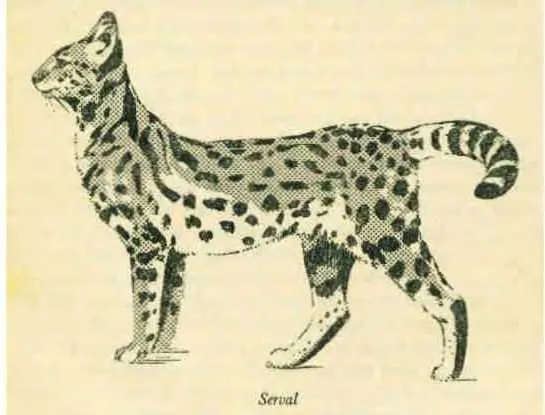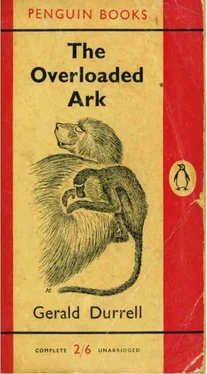Along the road a speck that looked like an exotic red beetle became the Mamfe to Kumba lorry, apparently creeping along the road and dragging a plume of dust behind it. I followed it along for quite some time and then switched to something else, which was a pity, as half a mile further on the lorry went through a bridge and dropped twenty feet into the river below, a thing I did not learn about until I returned home and found that John had spent the afternoon administering first aid to the wounded passengers.
As the hunter was slumbering peacefully I at last climbed down from the rock and explored the grass field. On the opposite side, some twenty feet into the trees, I came upon a glade between the great tree trunks, and here a tiny stream meandered its way through moss-covered boulders. This, I decided, was the very place for a camp. When I had examined the ground, peered under a few boulders, and generally investigated the position, I walked on through the forest, and presently came to another grass field, much larger than the first. So apparently the camp site I had chosen was in a tongue of forest, bordered on two sides by grass. This struck me as admirable, for I felt that these grass fields might well yield some good specimens.
Returning, I found the hunter awake, and I suggested that we should now return as I had seen all I wanted to see, and it was getting late. He led the way without a word; he was by far the most silent inhabitant of the Cameroons I had come across. The way down was much easier, and so we made better time. As we reached the last slope of the mountain a sudden wind sprang up, bringing with it a sharp shower of rain. Leaves and small branches were ripped from the trees and fell all about us, and somewhere in the forest we heard a splintering crash that denoted the fall of quite a large branch or tree, bent beyond endurance by this sudden fierce wind.
We arrived at Fineschang wet through, and I took shelter in the hunter’s evil-smelling abode, where presently Daniel joined me. After we had smoked for a while the hunter showed no signs of broaching the subject, so I asked him when he would lead my party up the mountain and pitch the camp, and how much he would want for the job.
“Masa go pay me twenty pounds for do dis ting,” he stated calmly.
I was so surprised I laughed, which seemed to annoy him, for he went into a long tirade about the ju-ju that lived on the mountain over which he was the only man to have any control, and what a dangerous business it was placating a ju-ju, and so on. Then he really nettled me by stating that I could not go up the mountain without him, so I would have to accept his price. It had stopped raining, so I rose to my feet and glared at him.
“Listen, my friend, if you go take me for dis place I go pay you two shillings a day, and I go dash you when I come back if I catch good beef up dere. If you no agree, I go for dis place myself. I go get other hunter man who go help me, you hear? If you agree, tell me.”
The hunter looked at me scornfully and said something derogatory in his own language, to which Daniel replied heatedly.
“Does he agree, Daniel?”
“No, sah, he no agree.”
“Come, then, we go leave dis stupid man,” I said. I laid three shillings on the step of his house and strode out of the village wrathfully, mounted the bicycle with all the dignity I could muster, and rode away.
WE started for N’da Ali at some hideous grey hour in the morning, and by the time the sun had broken through the mists we had reached the lower slopes of the mountain. It was a hard climb from then on, and the carriers moaned and whistled and gasped as they crawled their way upwards, hoisting themselves and their loads from rock to rock, and edging their way over and around the great curled tree roots. It was in this type of country more than in any other that I felt a great respect and sympathy for my carriers. Here was I, unencumbered except for field-glasses and a shotgun, gasping for breath and feeling my heart pounding as though it would burst, having to sit down every half-mile or so for a rest. Yet the line of carriers crawled steadily upwards with their great loads balanced on their woolly heads, their faces gleaming with sweat, and their neck muscles standing out with the effort of supporting and balancing the boxes and bales. The Tailor and I moved ahead and above them, picking out the easiest path for them to travel, and the Tailor marking it with quick cuts of his machete into the green bark of the saplings. When we came to a place where the rocks were dangerous, or a huge tree lay across our path in a shroud of lianas, the Tailor and I would pause and wait for the carriers to catch up so that we could help them over the obstacle. As each carrier passed I would exchange a remark in pidgin with him, much to the amusement of the others.
“Iseeya, bo.”
“Tank you, Masa. . . .”
“You get power too much, my friend.”
“Na true, sah.”
“Walka strong, bo.”
“I go try, Masa.”
And so on as each grinning, sweating man negotiated the difficult area. On reaching the other side in safety each man would whistle sharply through his teeth, a great exhalation of breath that echoed briefly through the trees.
After an hour’s steady climbing I judged that we were about half-way to our objective, the place I had chosen far the campsite, and so I called a halt on a comparatively flat area of land. The carriers put down their loads with grunts of relief and squatted round on their haunches breathing deeply, while the Tailor distributed the cigarettes I had brought for them. Half an hour later the men rewound the little mats of leaf or cloth which they place on their heads, the loads were hoisted up again, and we set off on the last lap of the journey.

We had started up the lower slope of N’da Ali at seven-thirty, and by eleven we had reached the flat area of forest that represented the great “step” that ran along one side of the mountain. It was not long before we passed through a small grass field, and on the other side we entered a thin woodland bordering on a small stream. Here the loads were put down and great activity took place: the tent was erected, a kitchen was made out of saplings and grass, and the carriers built themselves tiny, goblin-like houses among the tall buttress roots of a huge tree nearby. When some sort of order had been established the Tailor, myself, and the youth who was to act as bird trapper went into the neighbouring forest and picked out and marked some thirty spots that seemed likely places for setting traps. Then the youth was sent off to cut himself the twigs and branches for trap building. Having got this under control I wandered off by myself, following the course of a tiny stream that glinted and purred its way through the mossy boulders twenty feet from my tent, in the hopes of finding a place deep enough to bathe in. Soon I found the stream entered a thick tangle of low undergrowth, and here it flowed over a great sheet of rock, which it had hollowed out into a series of pools. The largest of these was some fifteen feet long, and about two feet deep: it was lined with a bed of white sand and a scattering of small smooth yellow pebbles. As a natural bathtub it left nothing to be desired, and I stripped and stepped gratefully into the water. The shock I received was considerable, for the streams in the lowlands, though cold, were not unpleasant. But this stream was pure snow-broth that numbed sensation and made the extremities of your body ache. I splashed half-heartedly for a few minutes and then climbed out with my teeth chattering, and gathering up my shoes and clothes I made my way through the undergrowth into the grass field. After assuring myself that there was nothing more dangerous than a few locusts about, I stretched myself in the sun to dry.
Читать дальше











